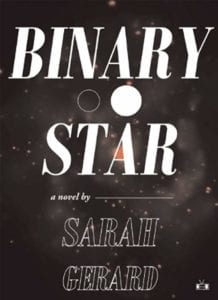
Shelf Unbound: Your main character says, “A binary star is a system containing two stars that orbit their common center of mass.” In this case, the anorexic/bulimic unnamed main character and her alcoholic boyfriend are orbiting their addictions. You use the solar system as a metaphor throughout the novel—how did that idea come about?
Sarah Gerard: I started reading about stars when I was writing an essay for BOMB Magazine about Charles Yu’s novel How to Live Safely in a Science Fictional Universe. Originally, black holes interested me—how they warp space time, how objects crossing the event horizon change in shape and appearance. Then I learned that black holes are often unseen binary companions, and this led me to reading about binary stars, and stars in general. I’ve also always loved science fiction, especially sci-fi movies, and Stanislaw Lem’s Solaris. Writing a novel set at least partially in outer space, even if figuratively, felt natural.
Shelf Unbound: Your 2012 essay in the New York Times, “On Hunger,” candidly details your own struggles with anorexia and bulimia. Why did you choose fiction over memoir to tell your story in Binary Star?
Gerard: I was drawing heavily from a particular period of my life but didn’t necessarily want the responsibility of a memoir; I felt that I should save others from possible embarrassment and, for my own sake, also give myself the freedom to fictionalize. I wrote the bulk of Binary Star very quickly—in about four weeks—so researching my own life was not really an option. I was much more interested in reading about stars than reading old journals and digging up details of my past. I also found it much easier to write the story as someone other than myself. This is not my story, but the narrator’s.
Shelf Unbound: The main character is obsessed with physical beauty and is constantly comparing her body to those she sees in celebrity magazines. You describe yourself doing the same thing in the NYT piece. What triggers this kind of obsession?
Gerard: Speaking for myself, I wanted to be everything I felt that they were and I wasn’t: beautiful, affluent, admired. In short, happy.
Shelf Unbound: I was moved by the end of your NYT essay: “I was going to be a writer, and writing was more important than being beautiful. Rather, I found, being beautiful was writing.” Was writing Binary Star cathartic for you, and are you truly able today to see your own beauty?
Gerard: I don’t think much today about whether or not I’m beautiful in the physical sense; I’m much more concerned with being a good person by my own measure. I haven’t owned a full-length mirror or a scale since I began my recovery, and I have a completely different beauty regimen than I used to—now it’s basically nonexistent. I brush my teeth and my hair, and that’s it. I rarely go shopping for clothes. I don’t neglect myself; I feel good the way I am. This isn’t only a result of writing the novel, though. This is years of hard work and support from people who love me.
Shelf Unbound: Unlike you, your main character fails to move on from or recover from her eating disorders. Why did you choose to give her life a different trajectory than your own?
Gerard: Well, I actually don’t know whether or not she recovers. The story ends on a rather bleak note, but who knows what happens after that? To answer your question about trajectory, though: 1 in 5 people suffering from anorexia die from the disease. And though I think it’s valuable to write accounts of anorexia that end well, I think it’s equally valuable to write books that speak to the real suffering of an anorexic person and accurately portray the possible outcome if someone doesn’t seek help.
Excerpt from Binary Star:
A giant turns red late in its life, when it exhausts the hydrogen fuel in its core.
Its surface is cool but its radius expands; it is luminous but has low mass.
The outer layers of the red giant are convective, bringing material exposed to nuclear burning to the surface for the first time.
This is the first dredge-up.
Last winter, we spent a month driving around the country’s perimeter. John’s parents paid for everything: hotels, food, and gas. Our job was to drive and come back in January: to find something new. At first we didn’t know what.
To step out of time, place ourselves entirely in the present, which is also eternity.
The week before we’re set to leave, I spent the night at a friend’s house on Jones Beach, cramming for a final. I call John at two in the morning, speeding on Adderall, and tell him that I weigh 98 pounds, which is true at that time. I had weighed myself several times during the night. Then I’d become afraid.
I tell him that I’m bulimic, which is also true, but not the whole truth.
You can’t purge when we’re away.
Then you can’t drink, I say
Okay.
We’ll find equilibrium.
We make a pact for balance.
We’ll shed our lives in order to see ourselves clearly.
As long as we’re together, we’ll be fine.
I agree.
This will bring us closer, I say.
I’m here for you, he says.
And I’m here for you.
From Binary Star by Sarah Gerard, Two Dollar Radio, twodollarradio.com. Reprinted with permission. All rights reserved.
